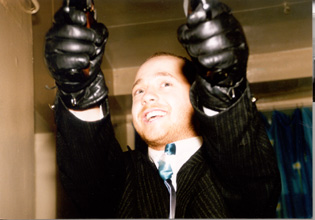Aprel
April
Konstantin Mursenko
Rußland 2002 |
| |
|
 |
|
|
Delphi
09.02. 21.30
CinemaxX 3
10.02. 10.00
Arsenal 1
10.02. 15.00
Babylon
11.02. 15.45
|
|
|
|
|
Produktion + Weltvertrieb:
Non-stop production
1, Mosfilmovskaya str., office 527, 119992,
Moscow, Russia
Tel.: (7-095) 143 91 60, Fax: 143 49 17
Buch: Konstantin V. Mursenko
Kamera: Maxim Popow
Musik: Danila Kalaschnik
Schnitt: Alexander Chupakow
Darsteller: Jewgenj Stytschkin, Michail
Krug, Denis Burgasliew, Jurj Kutsenko,
Sergej Mazajew, Sascha Kulikowa
Format: 35mm, 1:1.66, Farbe
Länge: 105 Minuten, 25 Bilder/Sek.
Sprache: russisch |
|
|
|
|
Um größere Schwierigkeiten mit der Mafia zu vermeiden, muss
der Waisenjunge April, ein junger Straßenräuber, einen Mordauftrag
annehmen. Er soll zwei zwielichtige Typen umbringen,
die die Geschäfte seines Auftraggebers, eines Gangsterbosses,
stören. Der Geschäftsmann Wowa, eines von Aprils potentiellen
Mordopfern, der in komplizierte Beziehungen mit der Unterwelt
verstrickt ist, versucht sein Leben zu retten, und erklärt sich bereit,
bei einem gefährlichen und dubiosen Coup mitzumachen.
Aprils und Vovas Wege kreuzen sich zu einer unpassenden Zeit
an einem sehr unpassenden Ort...
Konstantin V. Mursenko: „Stilistisch gesehen ist April ein Film
Noir. Eine heruntergekommene, farblose Industrielandschaft, eine
beunruhigende, immer mehr an Spannung gewinnende
Kollision einer komplizierten kriminellen Verwicklung. Aber April
handelt auch vom Wunder. Und davon, wie peinigend und laut
der Widersinn ausbricht, plump, lächerlich und schmutzig in
Form von Verzweiflung und Schmerz... Ein Killer zu werden, gelingt
Petja ohne Mühe. Aber das ist zu wenig. In einer kalten,
unwirtlichen Welt ist Flucht keine Rettung. Gewalt auch nicht.
Es gibt keinen offensichtlichen Ausweg. Es gibt nur die Hoffnung,
die man mit seinen verfrorenen Händen aufwärmen muss, die
Ironie der Umstände, das Lachen, das vor dem Wahnsinn rettet,
und die Intensität der Intrige, die die Leidenschaft erzeugt –
jene
Leidenschaft, die die Kraft bewirkt, die leere und zugleich undurchdringliche
Sinnlosigkeit zu bewältigen.“
|
| |
|
|
In order to set everything right between
him and some criminal bigwigs, the orphan
April, a young street buccaneer, has to accept
a Mafia boss’ orders to “eliminate“ two
shady characters; they are alleged to have
framed the godfather, but in fact they are
interfering with his business. At the same
time, one of the intended targets, Vova, a
businessman entangled in complicated relations
with the criminal world, has to save
his own life by agreeing to participate in a
dangerous and dubious affair. April’s and
Vova’s paths cross in a beautiful and intense
moment, in a very inappropriate time
and place. In the course of one night, the
characters try to solve their problems, find
the truth and, probably, pay a very high
price for it.
Konstantin V. Mursenko: “From a stylistic
point of view, April is a film noir. It features
a run-down, colourless industrial landscape
and a disturbing, ever-more gripping collision
course of criminal circumstances. But
April is also about a miracle, about how
tortuously and loudly evil absurdity bursts
into our lives; clumsily, ridiculously and
dirtily as frustration and pain. And yet life
refuses to be transformed into a senseless
farce. ... Petja has no trouble becoming a
killer. But that is not enough. And it makes
no difference. In a cold, inhospitable and
needy world, escape is no option. Nor is violence.
There are no obvious exits, only the
hope you try to kindle in your frozen hands,
the irony of circumstance, the laughter
that saves us from madness, and the intensity
of intrigue that spawns passion –
the kind of passion that gives us the
strength to overcome empty and yet impenetrable
senselessness.“
|
| |
|
Biographien / Biographies
Konstantin V. Mursenko, geb. 1969 in Leningrad. Publizistik-Studium am Fachbereich
Journalismus der dortigen Universität.
Autor von Filmdrehbüchern und Dialogen. April ist sein Regiedebüt.
|
